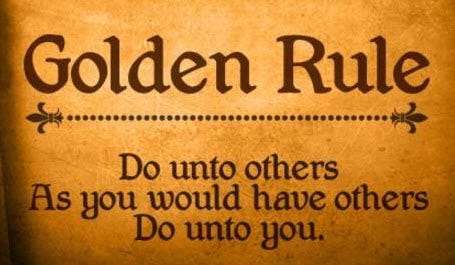Where do rules come from?
Question everything.
It all started with language. Let me explain.
Hominoids were early humans that walked on two legs, looked remotely human, used tools and developed many of the behaviors we have today. Our ancestors created human language.
When our direct predecessors, Homo Sapiens, roamed the cradle of man (Central and Southern Africa) about 200 000 years ago, they were hunter gatherers. Hunting hares, fish and birds as well as digging up roots and tubers.
Four to five Hominoid species are thought to have co-existed in other parts of the world, during that time. We still have many of their genes (Neanderthals), but they all went extinct. Homo Sapiens is left. What made Homo Sapiens so resilient?
According to Vishen Lakhiani in his book “The Code of the Extraordinary Mind” it was the development of language. Think about it. The moment humans could talk, they could communicate with more than body language. They could utter sounds with meaning in addition to gesticulations and facial expression. They could talk about yesterday (when the lion nearly ate them) or about tomorrow (when the rains were coming again). Hominids could exchange experiences, emotions and knowledge to other members of the tribe. Learning and cooperation was boosted immensely. Humans had now entered the world of abstract thought and communication.
This is profound. We could now start to develop stuff that was imaginary and talk about it to our family and friends. As we know, everything is created twice. Once in your mind, and then in real life. Every human endeavor works like that. We now had a tool to work with mental and physical “blueprints”.
Rules fall into that category. They are “blueprints” for our behavior. They are verbal or written guidelines for guiding human actions and thinking. There are two types of rules.
The first rules are those of nature. They are what they are. We also call them laws. We find them in mathematics, physics and chemistry. The underlie our physical world. At least that is what we think. Humans are continually trying to challenge and modify them. Nature is forgiving, yet firm. It will yield a bit, and then come back to its own balance. We can work with nature, or even cheat a bit. We can never work against nature.
The second type of rules are man made. They are mental constructs. Thought up in our minds, influenced by emotions and sometimes logic. Many of them are designed to control others. Communicated and entrenched by language and writing. Passed on over generations. Rules and traditions go hand in hand and are often culture and region specific. Also, rules change over time. They are part and parcel of our culture and evolution. They need to be evaluated and questioned. Like pruning a tree.
Some of these are useful. Like “Wear a seat belt” when driving at high speed. Some are plain “bullshit”. Like “Hold your knife in your right hand” or “You should never eat dog meat”.
Vishen Lakhiani calls bullshit rules “Brules”. How do we know which are good and which are useless or even limiting? Most of it is common sense. If they protect you from harm, they may be useful. If they just serve to keep the status quo they need to be questioned. I today’s world we are inundated with rules that control us. Nobody knows who made them up, why they are there and who they are supposed to benefit.
The last 3 years have been dominated by “Brules”. They were used to lie, mislead, suppress, censor, coerce and subjugate the global population. Never in the history of man have rules become such a toxic part of our existence.
Often they are just there. If you want to do something, you should or must follow the rule. When I encounter such rules, my alarm systems come on.
Here are 10 key questions to ask if confronted with rules:
Are they natural or are they man made?
Are they still relevant in today’s environment?
What happens if I don’t follow this rule?
Do they help my community or do they limit our daily activities?
What does the rule achieve?
Who do they benefit?
What reason do I have to follow this rule?
Is there a better way to achieve the supposed benefit?
Is there a way to bypass or ignore the rule and still lead an ethical and fulfilled life?
Can this rule be made simpler and better?
Check it out. Walk around with your eyes, ears and mind wide open. Next time some figure of authority gives you a rule, ask him or her, why? When the answer is “Because I say so”, or “It has always been like that”, this is likely to be a Brule.
Have a great week and check out our new CHAT FEATURE!




